A first-time parent? Congratulations! From the minute you discover you’re expecting a child, you will see your life begin to change.
Despite the fact that life will never be exactly the same again, you will learn something new every day, which can enhance your life and, furthermore, influence you to feel a wide range of exceptional feelings.
A few encounters with your child will fill you with adoration, bliss, pleasure, and shock.
In different circumstances, you may feel focused, baffled, irate, and even frustrated. All these forceful feelings are normal, and you may discover yourself experiencing them all in one day.
Questions that you ask in the first days of your newborn as first-time parents

WHAT HAPPENS TO MY BABY AFTER DELIVERY?
After the delivery, your baby will be checked by the doctor or midwife and will be given an Apgar score (see below). She will also be weighed and measured. If all is well, she will be handed to you to hold and put to the breast if you want to. Your baby will also be given a dose of vitamin K.
WHY IS MY BABY GIVEN VITAMIN K AT BIRTH?
Vitamin K is made in our bodies and is needed for blood clotting. Newborn babies lack vitamin K since they don’t have the right bacteria in their gut to make it. So they can sometimes bleed, with serious results if this bleeding is into the brain.
However, this so-called hemorrhagic disease of the newborn can be prevented by giving vitamin K. This is sometimes done at birth one dose by injection. There’s been some concern that vitamin K injections might be harmful to babies, but there seems to be no good medical evidence for this.
HOW SOON CAN MY BABY RECOGNIZE ME?
There’s evidence that babies begin to recognize their parents by sight within a few days of birth. Your baby uses all her senses from early on. She already knows your voice; she heard it long before birth.
Studies also suggest that babies learn distinct smells by the time they are three days old; even at this stage, they prefer a pad soaked with a few drops of their own mother’s milk to pads with someone else’s milk. In general, new babies seem to like anything that vaguely resembles a human face.
I THINK MY NEWBORN BABY IS SMILING AT ME ALREADY. IS THIS POSSIBLE?
Real smiling is said to start at around six weeks. Those fleeting smiles that parents notice in the first few days were once thought to be due to gas or a random facial experiment by the baby. But now many doctors agree that very young babies can and do smile. This may be in response to your smiles. They can also imitate facial movements, such as sticking the tongue out, from an early age.
WHAT IS THE APGAR SCORE?
Apgar score is a clinical assessment of your baby’s short-term well-being at and soon after birth. The check is carried out by your doctor or midwife one minute after the birth and then usually again five minutes after birth .
Example of APGAR BABY ’ S SCORE
| SIGN | SCORE 0 | SCORE 1 | SCORE 2 |
| Color of baby ( A ) | Blue body, pale limbs | Pink body, blue extremities | Pink all over |
| Heart rate (P) | Absent | Slow | More than 100 per minute |
| Response to a stimulus (G) | None | Grimace or some other response | Sneezing or coughing |
| Muscle tone ( Activity) | Limp | Some Tone | Actively moving |
| Breathing (Respiration) | Absent | Slow | Good or crying |
- A total score of 7 or over is normal; 10 is perfect, while 5 to 7 indicates that the baby may need observation or to have her airways cleared.
- A score of less than 5 usually suggests that the baby needs oxygen or other urgent treatment. The score should then rise.
WHAT WILL MY NEWBORN BABY LOOK LIKE?
Some babies are small while others are chubby. Many have very little hair, but a few have lots. The shape of their heads can vary, too, depending on the length of the mother’s labor and the method of delivery.
In the first few days, a baby has some distinct physical features that can look alarming to a new parent. Don’t panic. Some of what may seem to you to be peculiarities or even defects are really normal features that will change as your baby matures.
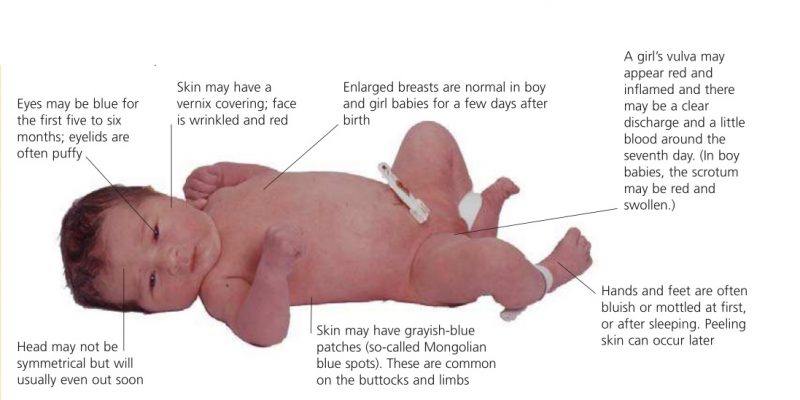
WHAT CAN MY NEWBORN BABY DO?
She may be helpless without food and warmth from you, but she is equipped with some skills and reflexes.
■ She can see, especially in the range of 8–10 in (20–25 cm). Her eye muscles lack coordination so she may be cross-eyed, but this does not mean she has a long-term problem. Her eyes don’t adapt to distance vision as well as those of an older baby.
■ She can also hear well and has a sense of smell.
■ She has a sucking reflex: when your finger touches the roof of her mouth, she will respond with a strong sucking action
How To Hold a Baby : 4 Safe Positions Videos & Pictures Guide
BABY ROOTING REFLEX

If you stroke her cheek, she will turn toward your finger and open her mouth. This reflex helps her feed.
BABY STARTLE “ MORO” REFLEX

If you pull her arms to their extent and let go quickly, she will throw out her arms and legs.
BABY STEPPING REFLEX
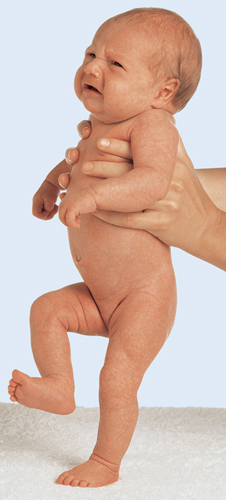
If you hold her upright, with her feet touching a firm surface, she will mimic a stepping action, even though she can’t walk yet.
BABY GRASP REFLEX
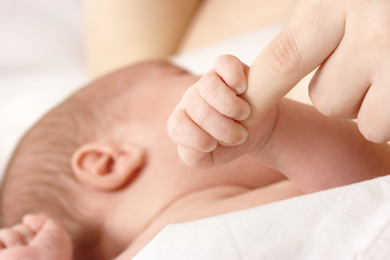
Stroking her palm with one of your fingers will cause her to grip your finger tightly.
WHY DOES THE DOCTOR CHECK MY NEWBORN BABY?
In the hospital, a doctor examines your baby before you go home to ensure that she is well and to rule out physical abnormalities. At home births, the midwife or doctor examines her a few hours after birth.
What does the doctor check?
■ Head: The shape and size of your baby’s head.
■ Heart and lungs: A stethoscope is used to check that the lungs are clear and the heart sounds normal.
■ Mouth: The doctor feels inside the mouth to check that the roof of her mouth has fully developed.
■ Abdomen: The abdominal organs are felt to check that they are normal in size, and the groin is
examined to rule out a hernia. You will be asked if your baby has moved her bowels; if not, her anus
and rectum may be checked by the pediatrician.
■ Genitals: Your baby’s external genitals are also examined by the doctor.
■ Hips: Your baby’s thighs are pressed downward and parted outward to see if the hip joints are stable.
■ Spine: The pediatrician runs a finger along her back to ensure that the spine has formed normally.
WHAT IS THE HEEL PRICK TEST?
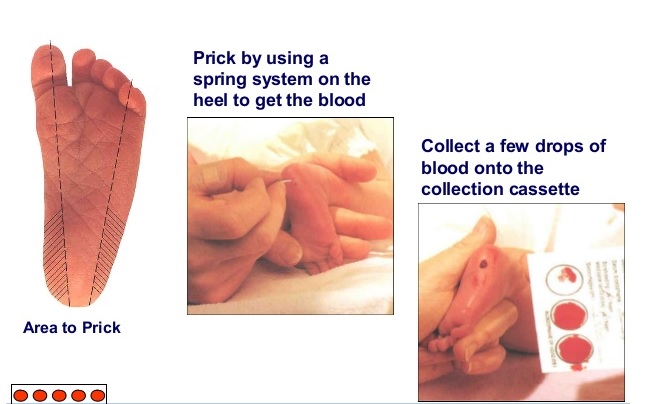
The HELL PRICK TEST is a small blood sample taken in the first 10 days by pricking your baby’s heel. The blood is tested for thyroid deficiency and for Phenylketonuria (a deficiency in body chemistry). If untreated, they can impair a baby’s growth and mental development.
Why is my baby so blotchy?
A newborn baby’s circulation is not fully developed. Because blood can “pool” in one part of the body, her upper half may look paler. Stork marks red or purplish V-shaped marks on the back of the neck be seen. Don’t worry; they are harmless and will fade.
Why are my baby’s eyes “sticky”?
Eyes can become sticky when infection of the lining of the eye causes a discharge or pus (conjunctivitis).
This condition is very common in new babies because they can pick up germs on their way through the birth canal.
The tear ducts of newborns aren’t fully developed, so they can’t get rid of bacteria as easily as older babies.
Babies can get conjunctivitis despite being given eye drops at birth. Cases of conjunctivitis in newborns need a pediatrician’s prescription for antibiotic eye drops or ointment.
Is dry, flaky skin normal?
Many babies have dry skin, especially when they’re a few days old. It is usually most obvious on the feet and ankles, but it can occur elsewhere in the diaper area, for instance.
Babies born after their due date usually have drier skin, but it improves with the use of a mild lotion or oil after bath time. Avoid bath additives, since they can worsen dry skin.
You Can Read Also : Get Equipped For Your Newborn Baby and How to prepare your checklist
What is jaundice and is it serious?
Mild jaundice (a yellowish tinge to the skin and/or the white of the eyes) is common in babies who are 2–3 days old. It occurs because your baby’s liver is still too immature to cope fully with bilirubin the yellow pigment produced by red blood cells as a normal waste product.
Premature babies are more likely to be jaundiced because their livers are less mature. Jaundice usually subsides after a week or two. The baby’s bilrubin level is checked before going home. If it is above normal the baby may stay at the hospital a few extra days.
I am considering getting my baby boy circumcised. Is this a good idea?
Circumcision is controversial but it has little or no medical benefit. There is no proof that it protects against urinary or other infections, or later, cervical cancer in the man’s partner. The hygiene argument is even more doubtful.
Circumcision is painful, so local anesthetic cream should be used if possible. Although serious complications are rare, they can lead to infection, gangrene, and death.
Sometimes men who were circumcised as babies resent what they think of as an assault on their genitals without their consent.
You have to weigh the advantages and disadvantages for your baby if he is born into a faith or culture where circumcision is expected, he could later resent not having been circumcised.
Conclusion
Perhaps you are one of the worried First-time parents who has just had a baby who is everything you hoped for except he is colicky. He looks just perfect, but something seems very wrong. You consult everyone you know, desperate for help and advice. Your pediatrician assures you there is nothing really wrong with the baby.

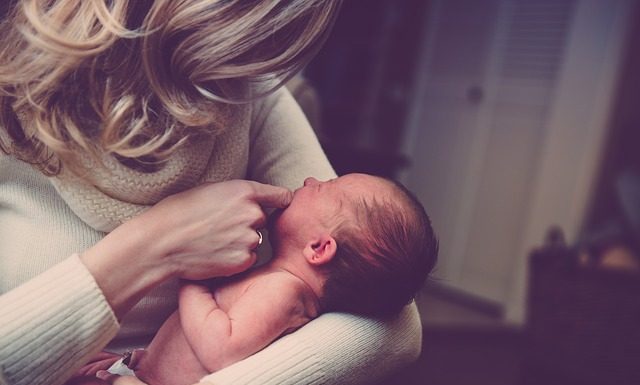



1 thought on “First Time Parents: Advice For Your Newborn Baby”
Comments are closed.